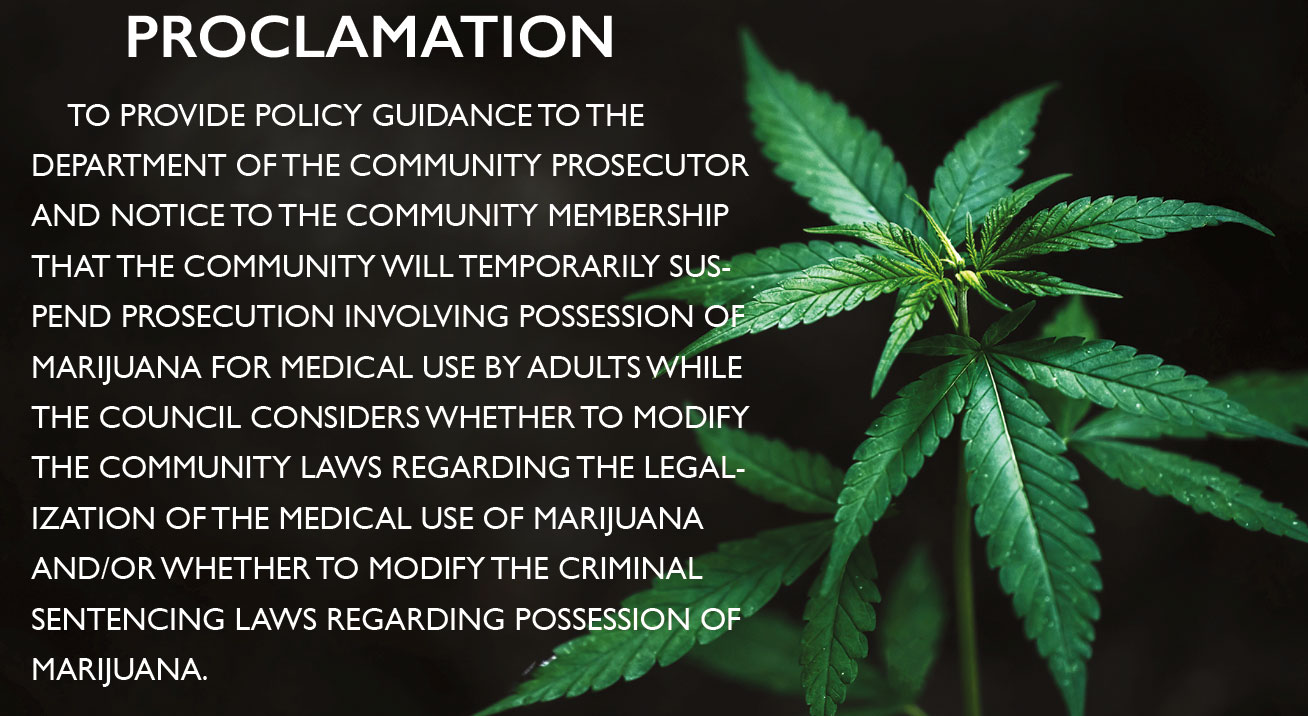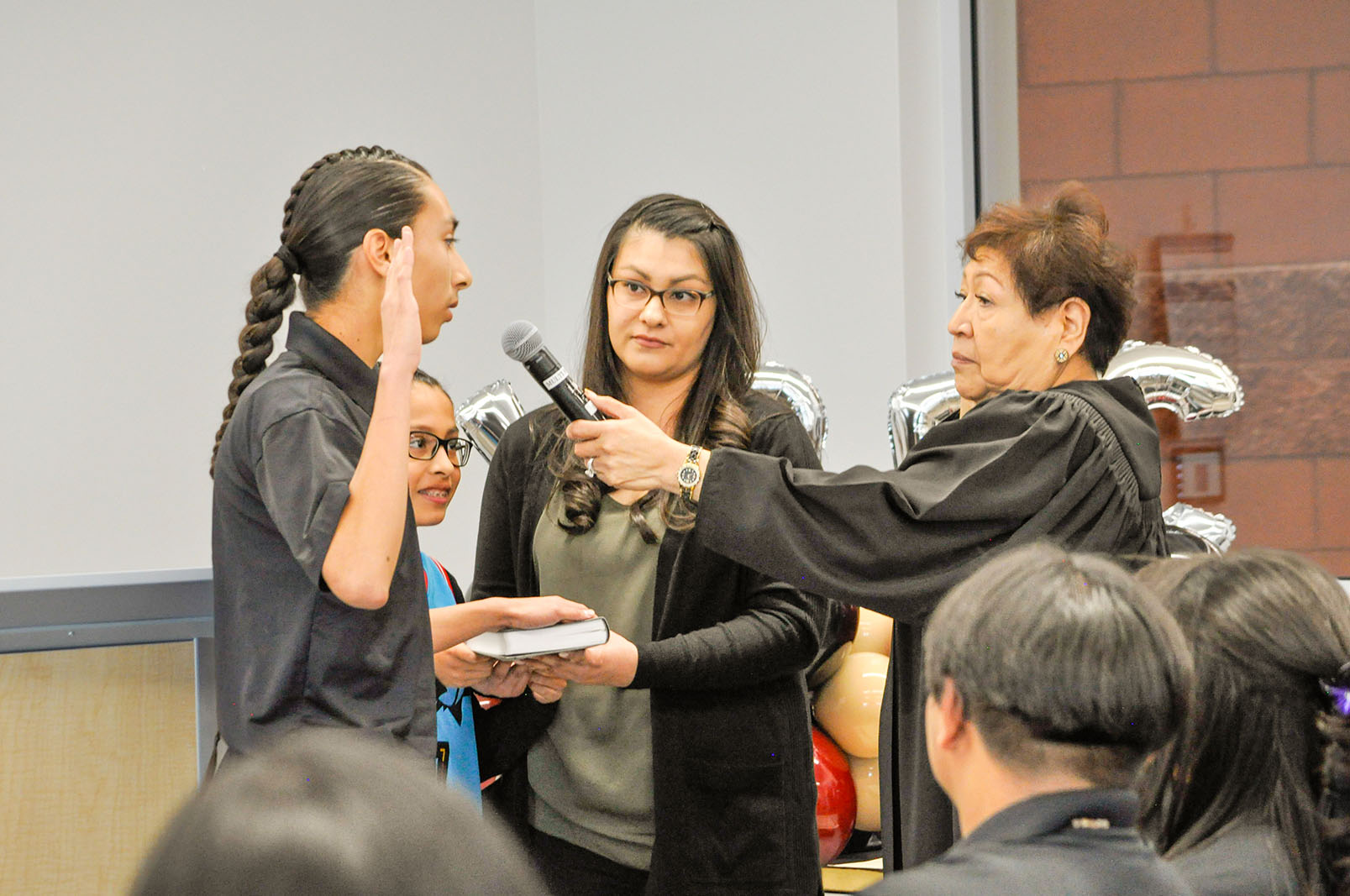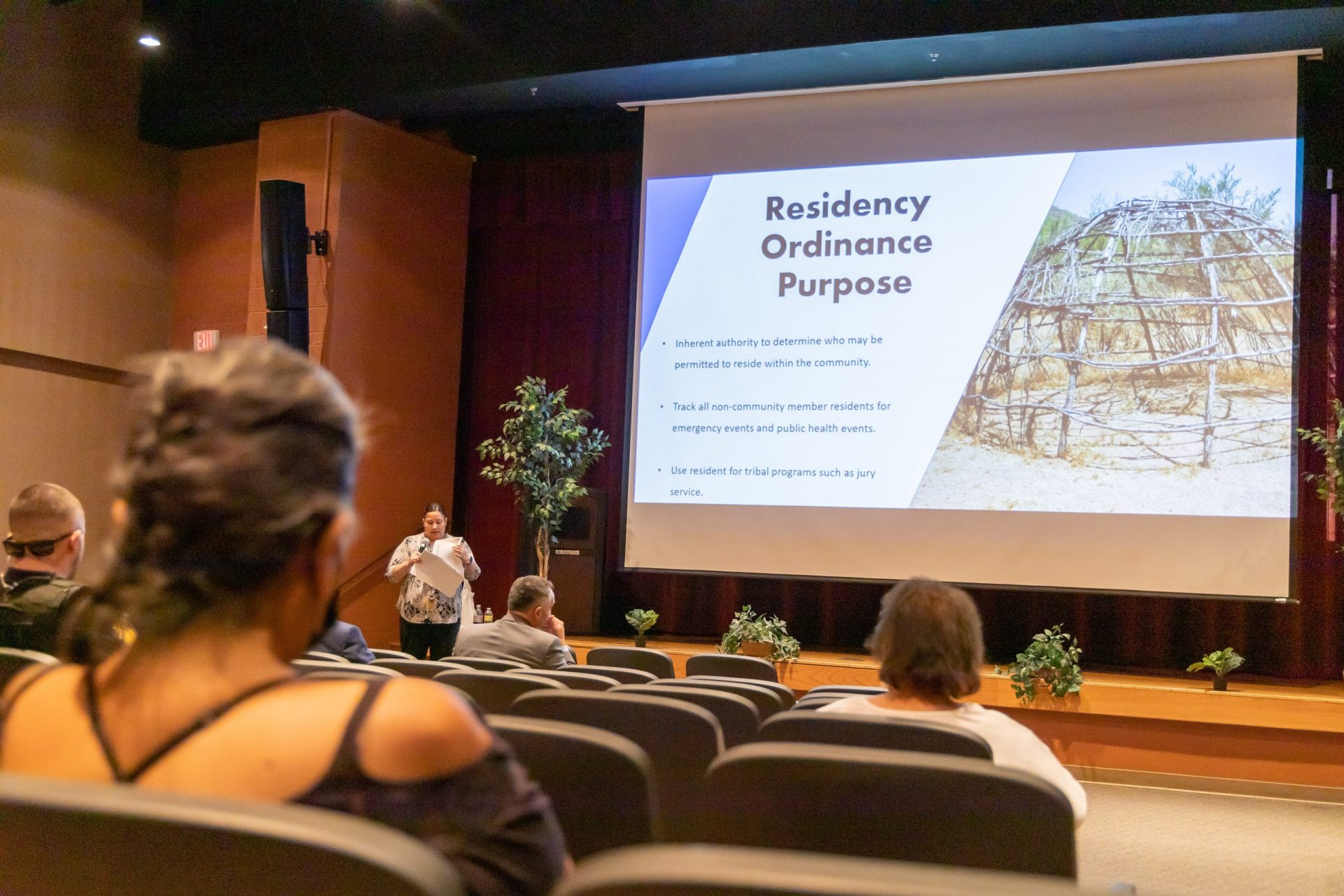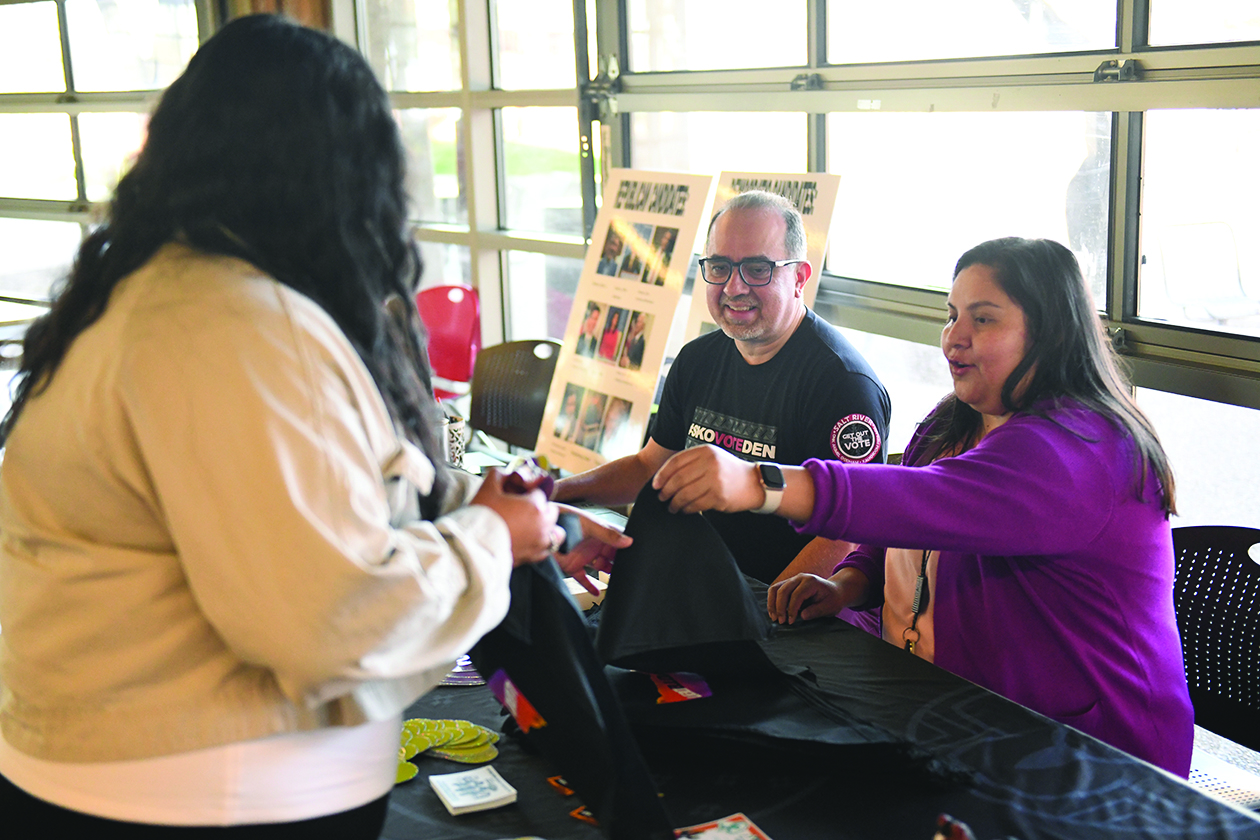VIEWS: 5182
January 6, 2021SRPMIC Requesting Community Input on Medical and Recreational Marijuana
During December, Salt River Pima-Maricopa Indian Community Council representatives discussed the use of medical and recreational marijuana.
During the District “A” meeting with Council Representative Diane Enos on Monday, December 14, a number of SRPMIC members listened in via Skype and phone to hear a presentation given by Assistant General Counsel Jeff Harmon on the passing of the Arizona Proposition 207, the Marijuana Legalization Initiative, in the November election and what it means for the SRPMIC.
The passing of Arizona Proposition 207 has legalized recreational marijuana for anyone 21 and older. Harmon explained that although the proposition passed in the State of Arizona, marijuana is still illegal in the SRPMIC. At this point in time, the Community is not presenting any laws on this topic, but it wants to inform the members on what the legalizing of recreational use of marijuana means and get feedback from SRPMIC members regarding their opinions are on the topic.
The presentation on Medical and Recreational Marijuana Use was an opportunity to let the Council representatives know how you [SRPMIC members] feel on the topic and that might give them [Council] some good information on whether they should change the laws or not, explained Harmon. Currently, there are no plans to change anything, it’s just an opportunity to get public feedback on this topic.
Again, this law that was passed for the State of Arizona does not apply within the boundaries of the Community. Regardless of what you hear, remember that marijuana in all forms and uses remains illegal in the SRPMIC. You cannot carry it, possess it, use it, have it under your control, dispense it, sell it, transport it or give it away. It’s a Class B offense, which is the Community’s second-highest level of criminal offense, meaning anyone who is convicted can go to jail for up to one year and pay a fine of up to $5,000.
“Something that not everyone knows is that our criminal laws only apply to SRPMIC members and other enrolled Native Americans,” said Harmon. “Salt River Police Department officers have to be familiar with tribal, state and federal laws; a case of marijuana possession by a non-Native in the SRPMIC falls under the state law. Whatever the state law is, that’s what that non-Native American would be subject to. Generally, before November 30, 2020, marijuana cases were submitted to the Maricopa County Attorney’s Office and they would handle that prosecution. If it was a Community member or Native American, it would be submitted to the Tribal Prosecutor’s Office and be handled in Tribal Court. That goes back to federal Supreme Court case law which talks about criminal jurisdiction in tribal communities.”
Not only is marijuana illegal within the boundaries of the SRPMIC, it’s also prohibited in the workplace. Community employment policies prohibit drugs in the workplace, and that includes marijuana. The Human Resources Department can test for drugs in four different ways: through pre-employment screening, random testing, reasonable suspicion and if an employee is in an accident.
The pre-employment screening includes a background check and drug test. If someone comes up positive, their employment offer is withdrawn and that person is not able to work with the SRPMIC. Random testing is when employees would regularly be called in for a random drug test. The third reason why an employee may be tested is for reasonable suspicion, if a supervisor or someone else suspects that an employee may be under the influence alcohol or drugs. Fourth, employees who are in an accident on the job are automatically tested for drugs or alcohol.
“Those are the four ways that people get tested, and sometimes we get a test that comes back come positive for drugs, including marijuana. So be aware of that for future employment in the Community or if you’re a current employee,” said Harmon.
What the Passing of Arizona Proposition 207 Means for the State
In 2010, the proposition allowing use of medical marijuana was passed in the State of Arizona. Arizonans with medical issues must see a doctor, get a recommendation, fill out the application and pay a fee to obtain a medical marijuana card. The card allows them to grow marijuana at home or go to a dispensary within the State of Arizona and purchase marijuana. It’s still illegal to have marijuana within the boundaries of the SRPMIC even if you possess a valid medical marijuana card.
There are state restrictions for medical marijuana; for example, you cannot possess marijuana on a school bus, on school grounds, at a jail, on public transportation or in any public place; it’s only to be kept and used in the privacy of your own home. Although you can use it for medical purposes, employers are still allowed to make their own rules in regard to the use of marijuana.
In 2016, the proposition to legalize recreational marijuana use in the State of Arizona was on the ballot; it was close but failed to pass at that time, with voters voting and 49% Yes and 51% No. Over the last four years, many states have seen propositions to make marijuana legal for medical and/or recreational use. In 2020, Arizona’s proposition passed, with the voters voting 60.03% Yes and 39.97% No.
“Now that the results have been certified, … this law is in effect,” said Harmon. “It is now legal to use marijuana in the State of Arizona. You do not need a medical marijuana card anymore and you can grow it at your home.”
The sale of marijuana in Arizona carries a 16% sales tax under this new law. Funds raised from the tax will be going to things like the state’s community college districts; municipal police, sheriff, police and fire departments; Arizona’s Highway User Revenue Fund; and a new Justice Reinvestment Fund.
“That high tax will benefit the state of Arizona and … it might benefit the Community as well,” said Harmon. “A lot of the funding from taxes might be available through grants, so even though [marijuana remains illegal] in the Community and we don’t directly get the sales tax money, our police and fire departments might be able to receive grants that are created because of the money that is coming in from those taxes, so we may be able to benefit from those funds in a secondary way.”
One other major benefit from this proposition passing is the petition to expunge marijuana convictions. Marijuana-related crimes such as possession, consumption and cultivation can be expunged later in 2021, explained Harmon. Individuals with a marijuana offense will have the opportunity to petition the court for that criminal offense to be removed from their record.
“It will take some steps to get that off your record,” said Harmon. “A marijuana charge is a class 6 felony, which is the lowest-level felony in the State of Arizona, but it’s still a felony and it shows up on your record. It could have happened when you were 22 years old and you’re now 40 years old, and it may still be affecting your ability to get a job. Or you have to explain that felony or address it every time you’re going for employment.”
Marijuana dispensaries are only allowed to sell to individuals with medical marijuana cards. The Arizona Department of Health Services is given the authority and duty to regulate the state marijuana industry and is not allowing recreational marijuana dispensaries to open yet. The department will start accepting applications from current dispensaries who want to sell for recreational use in late January, February or March 2021. After that, new dispensaries will be able to apply to sell for recreational use, but those new business probably won’t start popping up in the state until April, May, June or July 2021.
Community-Member Feedback Could Open Up Options
The SRPMIC is asking for members’ thoughts and opinions on medical and recreational marijuana. In the District “A” meeting there were some options discussed that the Community could decide in various ways such as through a Council decision, vote of the people or an initiative by the people to allow:
• Recreational use of marijuana in the Community, to mirror what the state is doing.
• Medical marijuana use in the Community, but no recreational use.
• Downgrading the level of criminal offenses for possession/use of marijuana by updating the criminal code of ordinances.
• Changing employment policies regarding marijuana by updating the Human Resources policy and testing procedures.
• Taking no action.
“I am really interested to know what the people think at this point, and because we are not at a formal comment phase, because we haven’t set up a proposed change to our code that people could comment on, right now we’re taking the temperature of the Community. We want to know what you all think,” said Enos. “I put this topic on my personal Facebook page, and so have a few other Council representatives as well, and [we’ve received] a good amount of comments. I can see where the different comments come from different age groups and different concerns. I realize that we need good information and education on this topic so we can make a good decision that is right for us.”
To share your input on this topic, please check the SRPMIC Facebook page at www.facebook.com/SRPMIC for upcoming district meeting dates where you can call in or join virtually through Skype.







